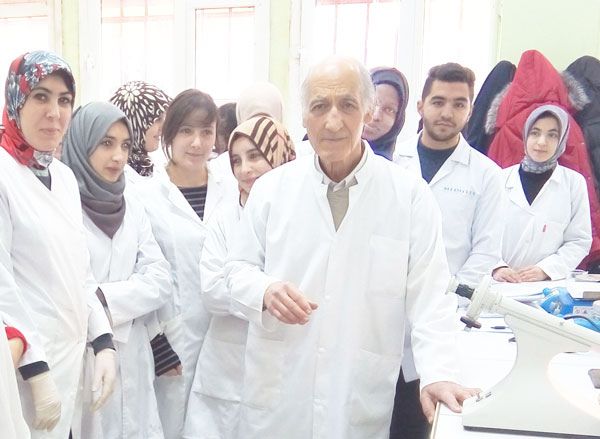By Mustapha Benmouna
 Medical physics provides an opportunity for scientists throughout the world to collaborate fruitfully. It is an interdisciplinary domain where not only physicists and medical doctors are concerned, but also researchers from chemistry, biology, mathematics and many other fields. This means that progress in medical physics requires a collective contribution from experts in complementary fields joining in a common programme. The challenges are so big that the collaboration between scientists may not be sufficient, and close coordination with policymakers may be required.
Medical physics provides an opportunity for scientists throughout the world to collaborate fruitfully. It is an interdisciplinary domain where not only physicists and medical doctors are concerned, but also researchers from chemistry, biology, mathematics and many other fields. This means that progress in medical physics requires a collective contribution from experts in complementary fields joining in a common programme. The challenges are so big that the collaboration between scientists may not be sufficient, and close coordination with policymakers may be required.
As the world population increases, so does the need for more energy to sustain economic development and the growth of consumption in all kinds of goods. Progress in science and technology leads to a growing use of energy, and then to the dissemination of polluting agents into the atmosphere. These rapid changes put a heavy burden on society, including threats to public health. For example, cancer has grown at alarming rates in recent years. This situation provides incentives for medical physicists to join their efforts to develop new techniques via scientific research that could lead to efficient therapies.
Epidemiological studies relate the emergence of cancer to a variety of factors like heredity, abnormal exposure to ionizing radiation, contamination by chemical products, and unhealthy eating and drinking habits. These observations suggest the necessity for medical physicists to put together a platform of exchanges where concerned scientists and policymakers can join to develop dedicated programmes for training and research.
The University of Tlemcen in Algeria (also known as Université Abou Bekr Belkaid Tlemcen) started a master’s degree program in medical physics in 2009, in response to a request expressed by the Ministry of Higher Education and Scientific Research. This program was first meant to be a contribution to fill the gap between the urgent needs for medical physicists and the insufficient training capacity of Algerian universities. The Algerian government is giving a particular attention to the rising number of cases of cancer in recent years, and initiated an urgent plan to build and equip several hospitals with cancer treatment centres.
These centres will be disseminated throughout the country to meet the increasing demands of the population. This should reduce the burden on patients, who currently have to move far away from their homes to get adequate medical care. For a population of nearly 40 million, only eight such centres and a few private clinics are effectively operating at present. Ten others are under construction; five are already are expected to be ready for patients within a year or less. One of these belongs to the university hospital complex at Tlemcen.
For the training program, special agreements of cooperation were signed not only with Tlemcen University Hospital but also with that of Oran, a major city in Algeria, which is about 150 kilometres east of Tlemcen. The majority of our master’s students spend at least one semester working in hospital services such as the anti-cancer centre of Oran and nuclear medicine of Tlemcen, under the supervision of medical professors, qualified physicians and medical physicists. A requirement in the training programme is to write a special report on one of the major themes in applied medical physics and make an oral presentation before a committee of four experts in the field.
The training programme lasts four semesters, during which students are taught basic concepts of how to assist doctors in manipulating particle accelerators, to insure good maintenance of electronic equipment, and to be responsible for protection from ionizing radiation. They also learn how to execute a medical doctor’s prescription for the treatment, implementing the proper prescribed doses, and thus how to fully understand the treatment procedure. Courses in ethics related to the specific duties of medical physicists are given, emphasizing the aspects related to adequate relationships with both the medical team and the patients. It is worth noting that the University of Tlemcen offers also a graduate programme leading to a doctorate diploma in medical physics.
Several members of the teaching team are medical doctors, working in the services of nuclear medicine of the university hospital. Therefore, our students are informed by the working conditions in those services and specially trained to handle questions related to radioprotection and radiobiology and the risks of manipulating radioisotopes. Medical physics and nuclear medicine overlap in those domains, which enhances the need for a close collaboration among concerned scientists, and a strong relationship with policymakers to help them make sound judgments and decisions.
Nuclear medicine is a major theme of collaboration between scientists and policymakers who wish to promote peaceful uses of atomic energy. It can be an important focus for science diplomacy, too. For example, the production of radioisotopes necessary to run nuclear medicine services for diagnosis and treatment of cancer is more accessible to some countries than to others, which means that it may constitute an ideal domain of cross-border collaboration under the auspices of the International Agency for Atomic Energy.
Mustapha Benmouna, from Algeria, was elected to TWAS in 1989. He is a professor of physics at the University of Tlemcen in Algeria.

